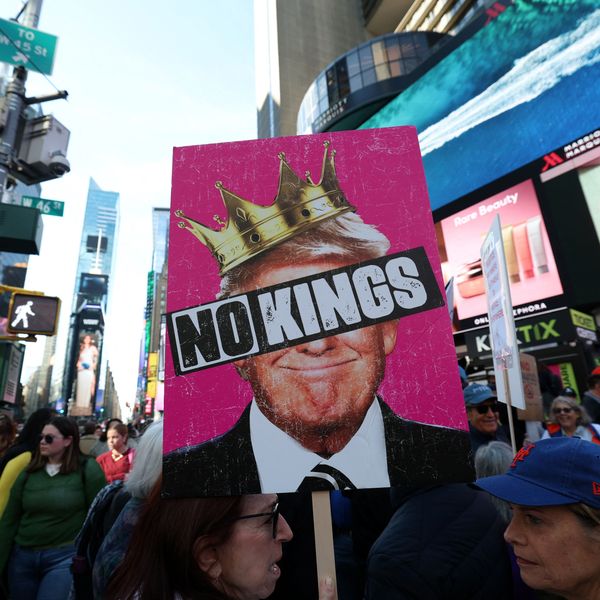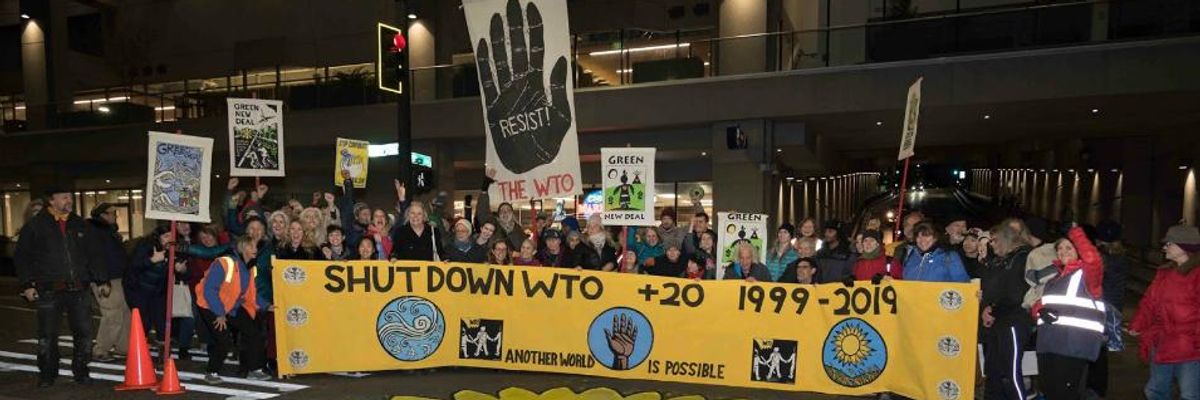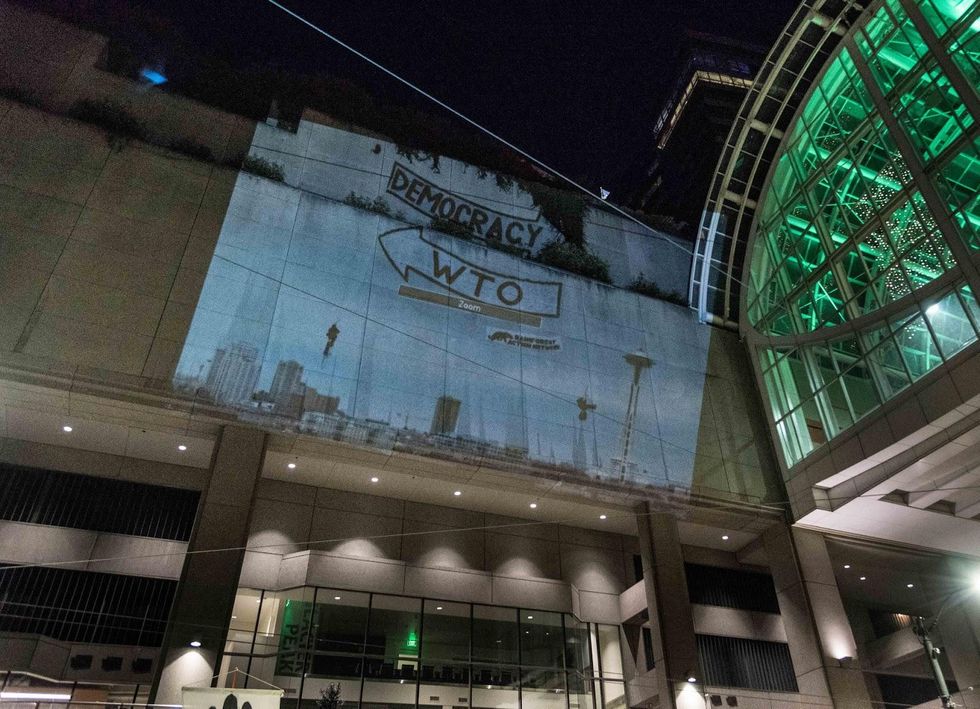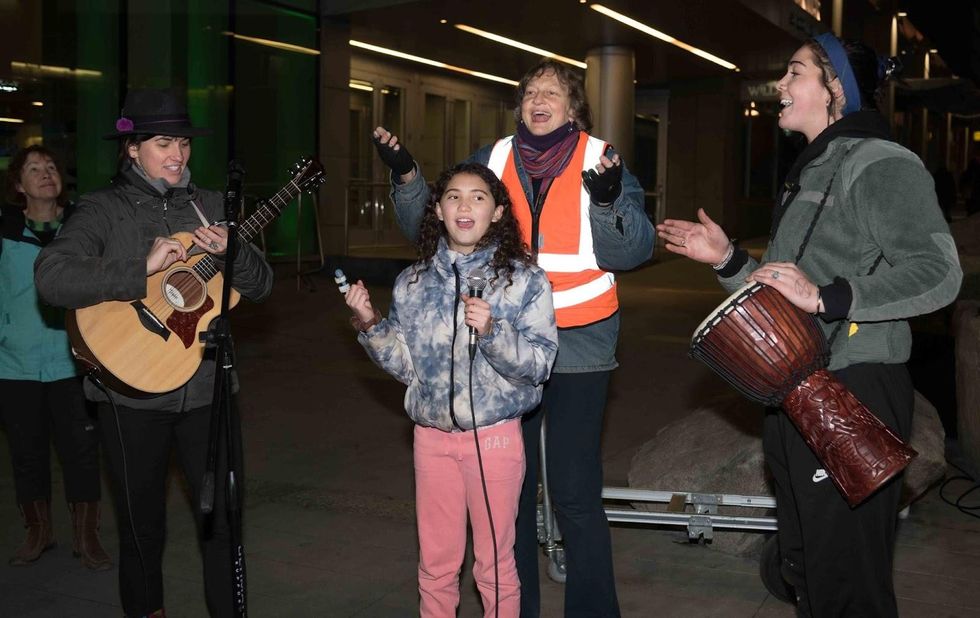This past Saturday organizers of the WTO uprising, from Seattle and beyond, collaborated to mark the anniversary, twenty years to the day, in ways befitting our 'festival of resistance'. Here is a review of some of what was said and done together.
At our Town Hall event, "Another World is Possible: WTO+20", we told stories through speeches, photos, and theater, and organized to support today's struggles. Workshops addressed strategies to prevent expansion of Big Tech power in today's WTO, La Resistencia's campaign to shut-down the Northwest Detention Center, and how to push Seattle's Green New Deal further. Later we took direct action and danced in the streets while images from 1999 were projected onto the Convention Center, where the WTO talks collapsed at the end of the Battle in Seattle. We caught up with old friends, and brought along youth climate strikers. It was a beautiful day of remembering, and building another world.
A cantastoria kicked off the event at Town Hall Seattle. This ancient art-form was shared by David Solnit to tell the story entitled "WTO to GND: WTF!" Then several organizers shared their reflections on the significance of the 1999 direct action, including Nancy Haque, Executive Director of Basic Rights Oregon, whose affinity group took over one of the intersections near the WTO meeting. "What made the difference in Seattle was the thousands of people willing to risk arrest, the thousands of people saying 'I will lay my body physically down,' whether it's on a street corner or putting your neck in a bike lock, people were saying 'I am willing to lay down and put my body in between this machine - the WTO - and our planet.' And it made all the difference in the world to a protest that would have gotten very little attention to something that we're still talking about today and still thinking about...we said that if we slow them down for a minute we'll have won, if we slow them down for a second so they have to think about what they're doing, and why they're here, and what they're trying to do to our planet, we'll have won. And so to actually have shutdown the meeting was an incredible victory and joy."

Edgar Franks, farmworker organizer with Familias Unidas por la Justicia was a student north of Seattle in 1999. "As a young student, coming from a Mexican family, farmworkers, the Zapatista struggle was something very near and dear to us, and something we want to learn from and build something like that locally in our small community in Skagit County. So over the course of a couple of months a small group of us had made it a point to come to Seattle, even though none of us knew what the WTO was." His group joined thousands at Memorial Stadium the morning of November 30th: "It was a big huge union rally which made me really feel good...That was one of the first times that I had ever seen white people talking about worker rights and standing on the side of workers. Little did we know, eventually a lot of those people would help us be part of the boycott and participating in picket lines almost twenty years after the fact of the WTO."
Indian food sovereignty activist Vandana Shiva, who spoke at the sold-out Benaroya Hall forum organized by International Forum on Globalization in Seattle in 1999, is an outspoken critic of the WTO. Regretting that she could not join in person, she sent a video greeting instead. "Seattle is the home of both the WTO protests of 20 years ago, and the home of the richest billionaires in the world. All we have to do is see how the billionaires became the billionaires they are: free markets for the billionaires, and closed markets for the hardworking small farmers. This has killed hundreds of thousands of people."
Several of the speakers, including Franks, participated in past WTO Ministerials; Deborah James has been at every one since the 2001 Doha meeting in her role as coordinator of the Our World Is Not for Sale Network. "We have been wildly successful in stopping the expansion of the WTO. But we have not been successful in transforming the system and changing the bad rules that harm millions of people around the world," James explained in her talk that focused on how big tech companies are attempting to write new rules to have control over how data is used. "Data should be for the public good, for the public benefit, not to make it privatized," James exclaimed.
Lisa Fithian, author of Shut It Down: Stories from a Fierce, Loving Resistance, shared that "In Seattle, we didn't just rise up out of fierce resistance, but we rose up out of fierce love for one another, taking care of one another, despite all of the harm- psychological, physical, emotional- that was done to stop us. When we shut things down, we are in the process of opening up a new space for something else to emerge."
Speaking to the central role of direct action in movements today, Paul Cheoketen Wagner, founder of Protectors of the Salish Sea, reminded us what is at stake. "We're fighting for our very existence right now. So when we stand in front of those oppressive powers, when we go inside of Chase Bank to shut them down, when we go in front of the capital, we walk 47 miles to tell Governor Jay Inslee to stop killing our culture, we say: 'Your government is killing our salmon and that's who we are. Stop destroying the culture of our children.'"
Artmaking also took place as David Solnit led screen printing and hand painting of patches for all the participants to take with them to commemorate 20 years. A set of Green New Deal designs were also screen printed and hand painted and given to local climate justice groups. Ther art-work is part of the Green New Deal Arts Kit, new designs by 5 movement artists coordinated by art.350.org and Labor Network for Sustainability.
Street Festival
Marking the anniversary of the WTO street uprising would not be complete without getting into the streets. In the evening a hundred people took over the intersection of 8th Ave and Pike St, a few blocks from Pike Place Market and directly in front of the WA State Convention Center, where the WTO meeting collapsed in failure 20 years ago. Dozens of activists chalked and painted a street mural in the intersection. The image referenced the famous one way signs in opposing direction reading DEMOCRACY/WTO, but updated to read "GREEN NEW DEAL/CAPITALISM." At the same time, Jill Freidberg, Indymedia co-founder and co-director of "This is What Democracy Looks Like," guerrilla-projected giant beautiful footage from the WTO protests onto the actual side of the Convention Center. Longtime artist-photojournalist-organizer Dana Schuerholz also projected her photos of the shutdown from 20 year ago. As all of this was taking place, Seattle iconic singer-songwriter Jim Page sang songs, culminating in a sing-along of "Shut it Down, Didn't We." Seattle singer-songwriter and songleader Alexandra Blakely led the group in song and performed with her daughter.


Think Global, Celebrate Local
In the months following the 1999 shutdown and protests, activists in Seattle gathered to ask what's next? The WTO uprising included dozens of educational forums on every issue related to global trade, successful direct action and huge marches led by labor unions. There was an opportunity to build off the momentum generated by the week-long protest and the months of steady organizing to mobilize folks in Seattle, most of whom had never heard of the WTO before, but were now inspired and informed.
After many months of consultation, Community Alliance for Global Justice was founded in 2001. Organizer Jeremy Simer led the effort, who worked with another co-founder, Bill Aal, in the People for Fair Trade office leading up to the protests. CAGJ held its founding retreat at Prag-Tri Farm, an important site for pre-WTO training. After several years of organizing opposition to free-trade agreements and supporting alternatives like Fair Trade, CAGJ transitioned to a focus on food sovereignty, which includes the need for more just agricultural policy between the Global North and South. As members of international alliances including La Via Campesina, CAGJ continues to fight for trade justice today, calling for agriculture to be taken out of trade negotiations - food should not be commodified!
CAGJ sees organizing to mark anniversaries of the WTO protests as a key part of its role locally, to ensure Seattle activist history is remembered and honored. The stories of 1999 get told in many ways; this year CAGJ partnered with United Food & Commercial Workers Local 21 to highlight the critical role of the Direct Action Network in shutting-down the WTO's opening ceremonies on N30, as this is too often left out of WTO narratives. Dozens of organizations co-sponsored including 350Seattle, WA State Labor Council, SEIU 925, LELO, Mazaska Talks and National Family Farm Coalition.
We Are Not Done! WTO+20 on Dec 7th, 2019
And we are not done celebrating 1999! This Saturday Washington Fair Trade Coalition hosts a rally, march, workshops and keynote with Joseph Stiglitz; (Registration required for the Town Hall Seattle events). Rally speakers to include Lori Wallach, Global Trade Watch; Rhonda Ramiro, Chairperson for BAYAN USA; Tefere Gebre, AFL-CIO; Robin Everett, Washington State Sierra Club; Ahmed Gaya, Sunrise Movement; Manuel Perez-Rocha, Institute for Policy Studies. Join us in the streets!






